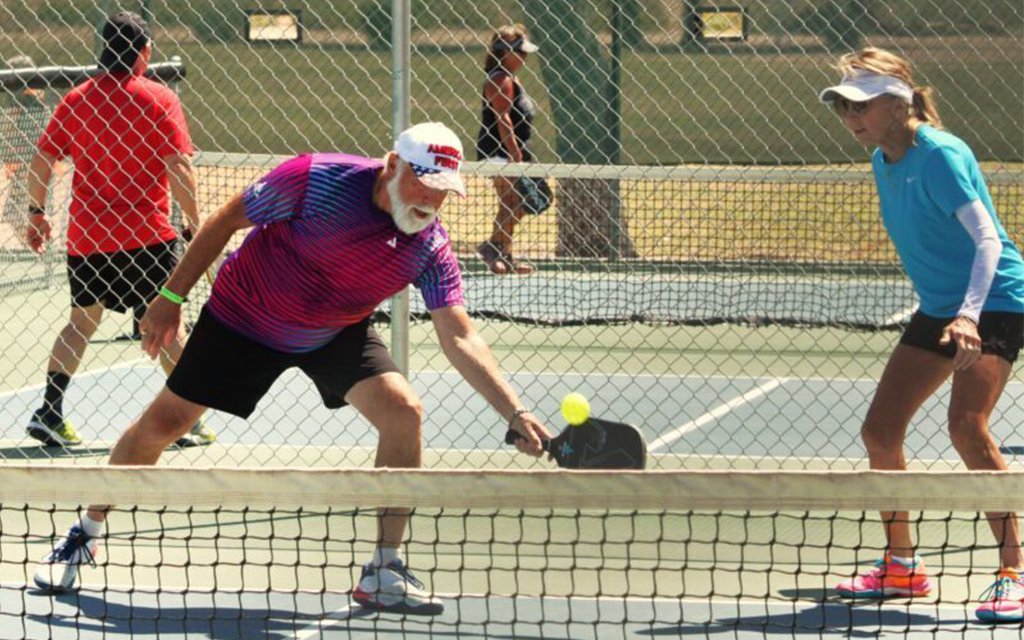
Players like Dave Zapatka appreciate the camaraderie and fun of team-based play, which adds a unique dimension to pickleball. (Photo courtesy of Arizona Pickleball Players League)
PHOENIX – From courts sprouting like dandelions across picturesque Pinetop to mini-arenas developing adjacent to some of the Valley’s ritzy resorts, pickleball’s stunning rise is visible across Arizona.
With more than 30,000 games played by over 4,700 excited players in the state, pickleball is the fastest-growing sport in the United States – and the Arizona Pickleball Players League is a prime example of the sport’s incredible growth over the past few years.
APPL’s story truly began in 2012, when founder and president Greg Mather created the East Valley Interclub League. As the league continued to blossom, other Arizona locations wanted to join the fun.
Seven years later Mather created the APPL, which served three additional areas that were eager to play and were initially interested in joining EVIL. In total, APPL serves four primary Arizona regions during the winter season, which begins in January.
The West Valley Region provides play for western Phoenix and nearby areas, including Glendale. The East Valley Region represents the other side of the Phoenix area, and it extends to the Globe-Miami area. The Casa Grande Region serves the area south of Phoenix and between Tucson. Finally, the Southern Region provides play for the greater Tucson area, which extends to Sierra Vista.

APPL caters to players of all ages and skill levels, with competitions in three age ranges and six different skill-level flights. (Photo courtesy of Arizona Pickleball Players League)
The league also includes the White Mountain Region — a summer-specific league northeast of the Phoenix Metropolitan area. The White Mountains have a much cooler climate than the other regions, so players are able to continue perfecting their craft over the summer.
APPL is a very unique league for a wide range of reasons. Most importantly, the league contrasts standard pickleball competition because it incorporates more than the standard singles or doubles format. Each team contains 10-12 pickleball players who compete against 8-10 other teams during the regular season.
For each game, the team captain brings three pairs to play against the opponent’s pairs. Every pair plays the opposing pairs twice.
“By the end of the two-hour match, we’ve played 18 games of pickleball,” Mather said. “All of us (each pair) have played six games each, that’s a good two hours and very competitive. That’s a reasonable amount of time to play competitive pickleball.”
APPL’s scoring sets the league apart from others. Competitors play to the standard 11 points, and teams must win by two. A win earns a team two points. However, a team can earn one point if it scores six points in a given match.
The scoring allows each pairing to have an impact on the whole team’s performance against its opponent. Mather says that even the least skilled players feel valuable to their team, which makes everyone invested to the last point.
“It goes down, quite often, to the last game of the last round, no matter who’s playing it,” Mather said. “How exciting is that?”
Not only does APPL cover a wide range of Arizona, but the league targets people of all ages and pickleball skills.
The league provides competition in three distinct age ranges – 18 and older, 50 and older and 65 and older. Additionally, there are six different flights, correlating with varying skill levels. Mather says the skill levels and age groups are meant to make competition as fun and fair as possible.
The APPL’s uniqueness creates a vibrant energy for all players, said Dave Zapatka, State Games of America gold medalist and three-time United States of America Pickleball National Tournament Medalist.
“I think team camaraderie is just a lot of fun instead of just playing as a single person or as a pair, you know,” Zapatka said. “In doubles, to be on a team where you can root for your teammates, it’s just a lot of fun.”

Founded by Greg Mather in 2012, APPL’s story began with the East Valley Interclub League (EVIL), and it has since expanded to serve multiple regions in Arizona. (Photo courtesy of Arizona Pickleball Players League)
Zapataka began playing in APPL during the league’s first season and has been playing in pickleball tournaments for nearly two decades. He won his gold medal competing in the 65-and-older group in 2015, earned a singles medal in 2013 and received two doubles medals in 2019.
While the league has sustained extensive success over the past four years, court availability could interfere with the league’s ultimate growth goal. Pickleball’s extensive growth across Arizona, alongside APPL’s substantial growth, has limited space at local parks, gyms and country clubs.
Luckily for players and captains, the league grew ahead of the bell curve and strategically promoted its brand to these locations.
“Before I came into APPL, they already had these negotiated agreements in place,” said Alexa Erjavic, APPL player and volunteer relations manager. “I think it was a little bit of a ‘We’ll build it and they will come, and then your park will become more popular.’ You’re serving your community anyway. If you think about it, it’s symbiotic for the people in the neighborhood who were using the facility anyway.”
These positive relationships have helped the league increase to 4,700 players in 2023. It will approach 5,000 players for the 2024 winter season.
APPL wouldn’t be anywhere near as successful without its growing number of volunteers. The league began with only three volunteers in 2019, and it grew to 25 for the 2023 season. Mather says the league plans for 34 volunteers in 2024.
Erjavic says she’s especially impressed by the volunteers’ persistent enthusiasm for the league. Volunteers don’t receive anything for helping APPL out, but they provide as much passion as the thousands of players.
APPL has an exciting future with a rapidly growing loyal fanbase. Mather says one of the next steps for APPL is to go beyond the Arizona borders. Right now, Mather is focused on the 2024 season that begins on Tuesday, Jan. 2.
“Leagues from other states have come to us and said, ‘We heard about APPL. We’d like to get involved in that. Could you help us set up a team-based league like you guys are doing?’” Mather said.
“One of our intentional initiatives now is not just to end our season with a state championship, but it’s to continue on with maybe regions and certainly a national championship.”
